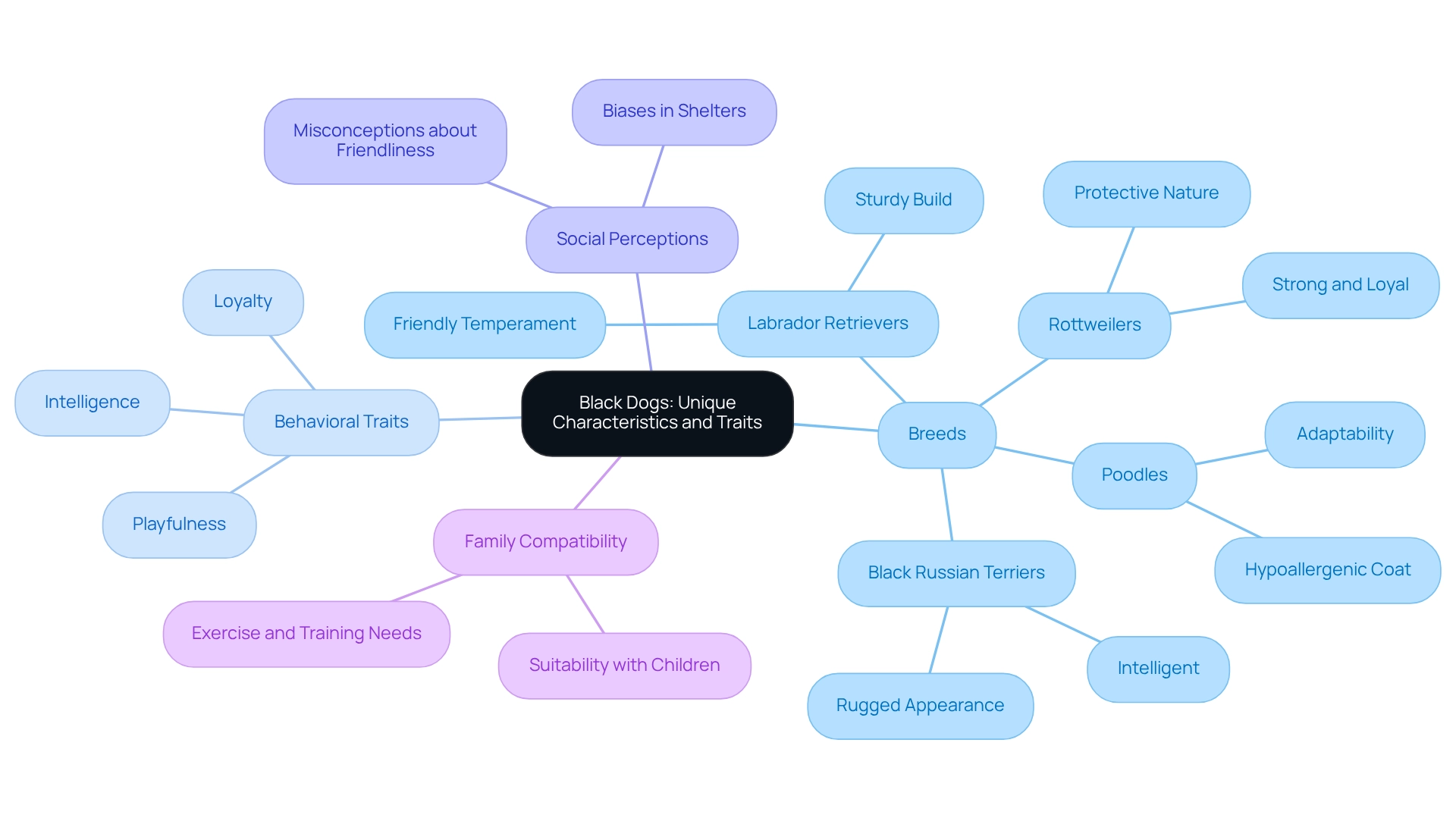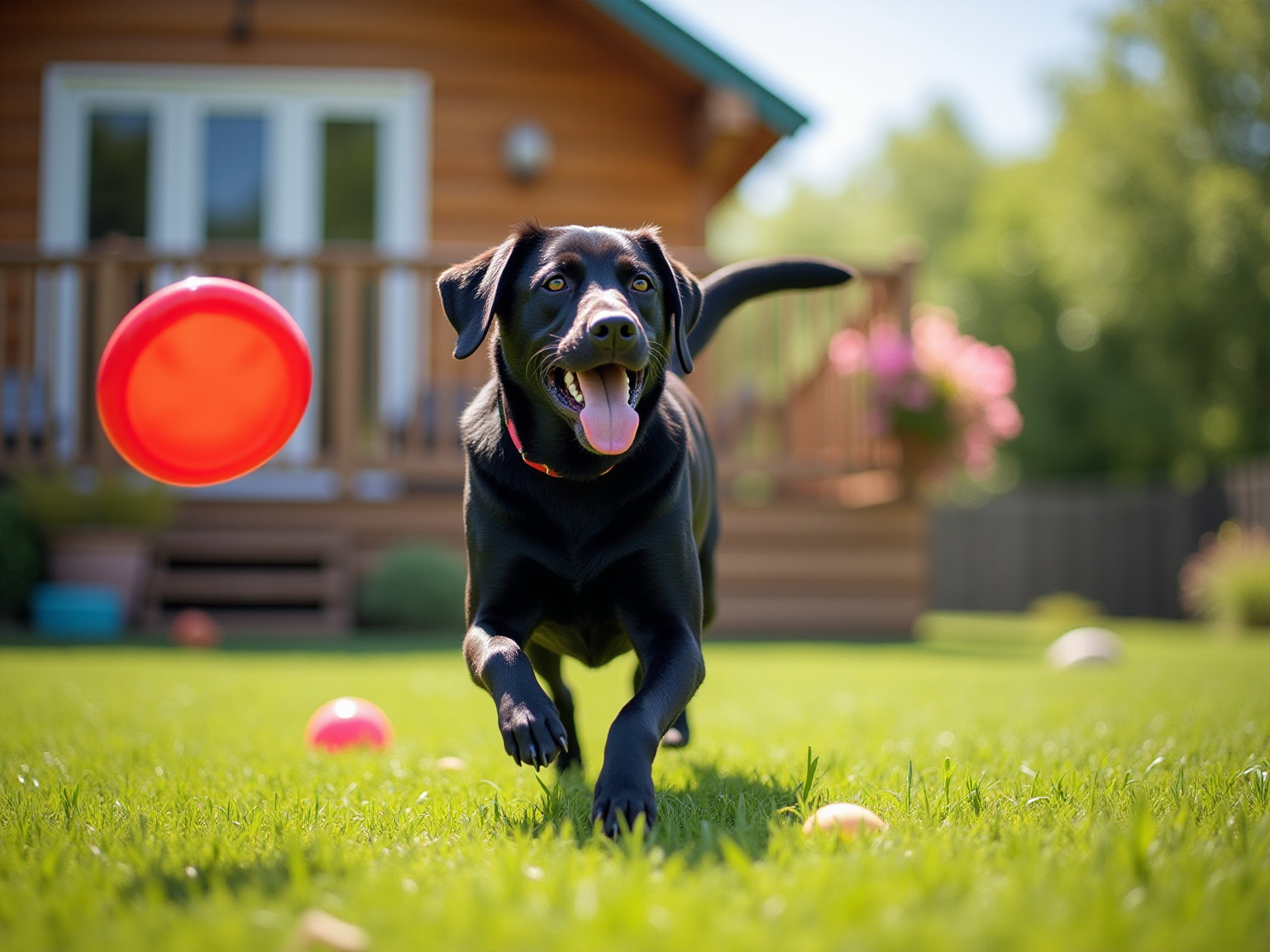Understanding Black Dogs: Traits, Myths, and Care Tips
Overview
This article delves into the unique traits, myths, and care tips associated with black dogs, highlighting their unwavering loyalty and their wonderful suitability as family pets. Despite cultural biases that often impede their adoption, it’s essential to recognize the individual characteristics of these furry family members. Understanding these traits not only fosters a nurturing environment but also helps challenge the misconceptions surrounding their temperament.
To ensure the well-being of black dogs, the article provides vital care advice, including grooming and health monitoring. By prioritizing these aspects, pet owners can create a supportive atmosphere that allows their pets to thrive. It’s crucial to address the concerns many have about adopting black dogs, as they can make incredible companions.
As we explore the stories of these loving pets, we invite you to consider the joy and fulfillment they can bring to your life. Let’s work together to dispel the myths and embrace the unique qualities of black dogs, ensuring they receive the love and care they deserve. Your journey towards nurturing a black dog begins with understanding their needs and advocating for their adoption.
Introduction
The allure of black dogs extends far beyond their striking appearance; they embody a rich tapestry of traits, cultural significance, and care requirements that often go unrecognized. These loyal companions possess unique characteristics that make them ideal family members, yet myths and misconceptions cloud their adoption rates. It’s time to shine a spotlight on black dogs in the realm of pet ownership.
As we navigate the complexities of these beloved animals, it becomes crucial to understand their specific needs and the historical biases they face. This exploration not only highlights the exceptional qualities of black dog breeds but also advocates for a shift in perception. Let us embrace these furry family members for who they truly are, nurturing an environment where they can thrive and be cherished. Together, we can change the narrative and celebrate the beauty of black dogs in our lives.
Defining Black Dogs: Unique Characteristics and Traits
Black dogs encompass a variety of breeds, each showcasing unique traits and characteristics that can warm any heart. Common features include a sleek, shiny coat that varies in length from short to long, depending on the breed. For instance, Labrador Retrievers and Rottweilers are celebrated for their sturdy builds and friendly temperaments, while the Black Russian Terrier presents a more rugged appearance. Behaviorally, black dogs are often acknowledged for their loyalty, intelligence, and playful disposition. Their temperaments can vary greatly; however, many black dogs are known for their loving nature and desire to please, making them perfect companions for families. The perception of black dogs can be shaped by their coat color, which may influence how their expressions are understood. This can sometimes lead to misconceptions regarding their friendliness or temperament. Research shows that black dogs are frequently neglected in shelters due to biases linked to their hue, despite their numerous positive characteristics.
A notable example is the Poodle, available in Standard, Miniature, and Toy sizes, known for its hypoallergenic coat and adaptability. Poodles are favored among families for their lower shedding and friendly disposition, showcasing how breed characteristics can align with family needs. As Patricia B. McConnell, a distinguished authority on canine behavior, stresses, understanding a dog’s individual characteristics is crucial for nurturing a positive bond between pets and their households. In family environments, studies underscore that black dogs frequently excel due to their loving disposition and suitability with children. Their playful spirit and loyalty make black dogs excellent additions to any household, reinforcing the idea that color should not dictate a dog’s suitability as a family pet. Furthermore, prospective dog guardians should consider the exercise and training requirements of black dogs to guarantee a harmonious match. Overall, understanding the unique characteristics of black dogs can help potential owners make informed decisions, ensuring a nurturing environment for their furry family members.

Cultural Significance and Myths Surrounding Black Dogs
Throughout history, black dogs have been surrounded by a tapestry of myths and cultural beliefs. In many cultures, they are often viewed with suspicion or fear, tied to superstitions about bad luck or malevolent spirits. For instance, English folklore sometimes portrays dark canines as ominous signs of death or misfortune. This negative perception has significantly contributed to ‘Dark Canine Syndrome,’ a phenomenon where black dogs face lower adoption rates in shelters compared to their lighter-colored counterparts. Studies reveal that dark-colored canines are 30% less likely to be adopted, illustrating the impact of these cultural biases.
Yet, despite these myths, advocates for animal welfare passionately emphasize that black dogs have the same capacity for love and loyalty as any other breed. Timothy Roberts notes, “Because of the color of their face, it is difficult to see their expression,” shedding light on a common misconception that can hinder their adoption. It is crucial to encourage potential pet owners to look beyond superficial traits and focus on the individual dog’s personality and needs. Celebrating events like National Black Dog Day is crucial for raising awareness and promoting the adoption of black dogs, who are often overlooked as pets. By challenging cultural views and highlighting the unique qualities of black dogs, we can help rewrite the narrative and ensure that every animal, regardless of hue, finds a loving home.
Moreover, the cultural significance of dark canines extends beyond mere appearances; they have been central to various beliefs, including reflections on their afterlife. The case study titled ‘Contemplating the Afterlife of Canines’ illustrates the enduring bond between humans and their pets, transcending life and death, offering comfort to grieving pet owners. By incorporating these perspectives, we can foster a deeper understanding of the legends surrounding dark canines and their rightful place in our families.

Essential Care Tips for Black Dogs: Health and Well-being
Caring for your dark-colored canine companions requires a nuanced understanding of their unique health and grooming needs. Regular grooming is essential, as dark coats tend to display dirt and debris more prominently than lighter shades. Consistent brushing not only maintains a healthy coat but also minimizes shedding, which can be particularly beneficial for keeping your home clean. Furthermore, dark canines are often more susceptible to specific skin disorders, such as dark skin disease, which can lead to hair loss and skin irritation. Vigilant monitoring of their skin health is crucial, and any unusual symptoms should prompt a consultation with a veterinarian.
In addition to grooming, it is vital for the overall well-being of your black dogs to receive sufficient exercise and mental stimulation. Engaging in regular playtime and training sessions not only maintains their physical fitness but also strengthens the bond between you and your furry family member. A balanced diet tailored to their specific breed and age is equally important, supporting their health and longevity.
Statistics indicate that the global animal grooming market was valued at $3.13 billion in 2020, reflecting a strong financial commitment from pet owners towards their companions’ care. This highlights the importance of regular grooming for black dogs. Regular grooming not only enhances aesthetics but also plays a critical role in preventing health issues, as evidenced by case studies demonstrating the benefits of routine grooming in maintaining skin and coat health. One such case study titled “Benefits of Regular Grooming” illustrates how grooming contributes to the overall health of pets, helping to prevent skin and coat issues while reducing shedding in homes.
As Nora Roberts wisely stated, “Everything I know, I learned from canines,” emphasizing the profound connection between canines and their guardians. By prioritizing these aspects, pet caregivers can ensure that their dogs thrive in a nurturing environment, particularly black dogs. Adventure Den stands out as a trusted choice for dog owners in Vancouver, further supporting your commitment to providing exceptional care for your pets.

Conclusion
The exploration of black dogs reveals their remarkable qualities, unique traits, and the challenges they face due to cultural biases and misconceptions. These wonderful companions are known for their loyalty, intelligence, and affectionate nature, making them ideal family pets. Unfortunately, many are overlooked in shelters due to unfounded fears and myths. Yet, black dogs possess the same capacity for love as any other breed. By understanding their individual needs and characteristics, potential owners can make informed choices, ensuring a harmonious fit for their families.
Cultural perceptions have historically painted black dogs in a negative light, contributing to lower adoption rates and perpetuating harmful stereotypes. By challenging these myths and advocating for the beauty and value of black dogs, we can shift the narrative, encouraging more people to open their hearts and homes to these deserving animals. Events like National Black Dog Day play a crucial role in raising awareness and celebrating these often-misunderstood companions.
Furthermore, essential care tips for black dogs highlight the importance of regular grooming, exercise, and health monitoring. By prioritizing these aspects, pet owners can create a nurturing environment that promotes their well-being. Ultimately, embracing black dogs for their unique traits and dispelling the myths surrounding them not only enriches the lives of these dogs but also enhances the joy of pet ownership for families everywhere. It is time to change perceptions and recognize black dogs as the loving, loyal companions they truly are.
Frequently Asked Questions
What breeds are commonly associated with black dogs?
Black dogs encompass a variety of breeds, including Labrador Retrievers, Rottweilers, and Black Russian Terriers, each showcasing unique traits and characteristics.
What are the common physical features of black dogs?
Black dogs typically have a sleek, shiny coat that can vary in length from short to long, depending on the breed.
What are the general behavioral traits of black dogs?
Black dogs are often known for their loyalty, intelligence, and playful disposition. Many are recognized for their loving nature and desire to please, making them great companions for families.
How does the perception of black dogs affect their adoption rates?
The perception of black dogs can be influenced by their coat color, leading to misconceptions about their friendliness or temperament. Research indicates that black dogs are often neglected in shelters due to biases related to their color.
What is a notable characteristic of Poodles as black dogs?
Poodles, available in Standard, Miniature, and Toy sizes, are known for their hypoallergenic coat and adaptability. They are favored by families for their lower shedding and friendly disposition.
Why is understanding a dog’s individual characteristics important?
Understanding a dog’s individual characteristics is crucial for nurturing a positive bond between pets and their households, as emphasized by canine behavior expert Patricia B. McConnell.
How do black dogs perform in family environments?
Studies show that black dogs often excel in family settings due to their loving disposition and compatibility with children, making them excellent additions to households.
What should prospective dog guardians consider when adopting black dogs?
Prospective dog guardians should consider the exercise and training requirements of black dogs to ensure a harmonious match with their lifestyle.
How can understanding black dogs’ unique characteristics aid potential owners?
Understanding the unique characteristics of black dogs can help potential owners make informed decisions, ensuring a nurturing environment for their furry family members.







